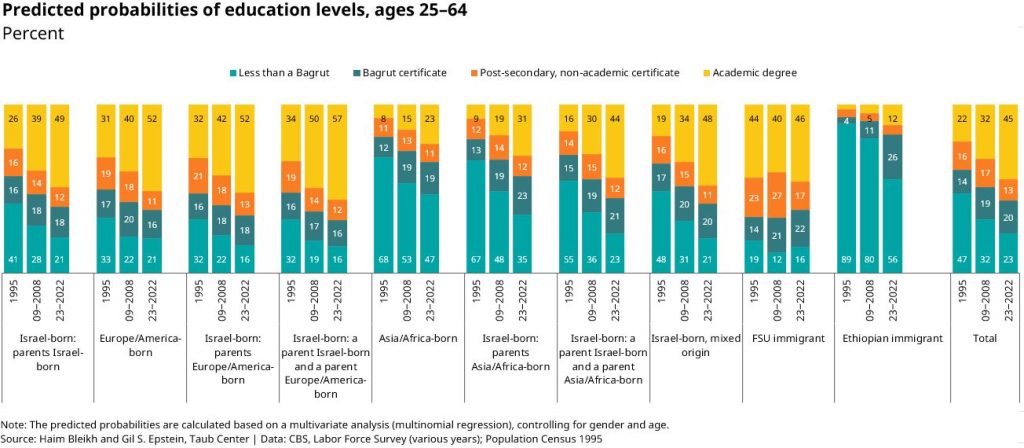The ethnic divide has been, and remains, one of the most charged topics in Israeli discourse. This Taub Center study examined educational gaps among Israel’s Jewish population from different origin groups — those of Asian/African origin, European/American origin, Ethiopian immigrants, and immigrants from the former Soviet Union (FSU). The study, conducted by Haim Bleikh and Prof. Gil S. Epstein, focuses on trends in education levels, higher education, and academic study choices, based on data spanning three decades (1995–2023). The findings show that the education level of the Jewish population has risen over time, but the changes were larger among origin groups that historically had lower levels of education.
Rising education levels across all origin groups, at an especially high pace among Asian/African origin and Ethiopian immigrants — but gaps with European/American origin remain large
- In the mid-1990s, there were large education gaps between individuals of European/American origin and those of Asian/African origin groups (first- and second-generation), as well as between Israeli-born individuals with one parent born in Israel and the other in Europe/America, and those with one parent born in Israel and the other in Asia/Africa (the “2.5 generation”); 89% of Ethiopian immigrants had no Bagrut (matriculation) certificate; among FSU immigrants, the shares with an academic degree and a post-secondary diploma were the highest (44% and 23%, respectively).
- Three decades later, gaps between origin groups have narrowed due to the consistent expansion of higher education in the population (except among immigrants from the FSU), especially among individuals of Asian/African origin (first- and second-generation) and Israeli-born with one parent from Israel and one from Asia/Africa. Among Ethiopian immigrants, whose starting point in the mid-1990s was the lowest, significant changes occurred: a sharp rise in Bagrut eligibility, alongside an increase in the share holding an academic degree (from 3% to 12%).
- The researchers emphasize that the education levels of Ethiopian immigrants are still significantly lower than those of individuals from other origin groups.
Expansion of higher education: the increase is especially pronounced among women
- The study shows that between 1995 and 2023, the share of those with an academic degree rose from 22% to 45%. Among women, the increase was greater (from 22% to 50%) than among men (from 22% to 39%).
- The representation of European/American origin groups (first- and second-generation), Israeli-born with one parent from Israel and one from Europe/America, and immigrants from the FSU among degree-holders remains the highest, but it has declined over the years due to the more rapid growth of education among the other origin groups: Asian/African origin (first- and second-generation), Israeli-born with one parent from Israel and one from Asia/Africa, Israeli-born of mixed ethnic origin, and Ethiopian immigrants.
- In the mid-1990s, immigrants from the FSU had a very high share of advanced degree holders among all academics (69% among women and 75% among men). The relative share of advanced degree holders was also high among those of European/American origin.
- Three decades later, the data show a substantial decline in the share of advanced degree holders among all academics in the FSU group (from 72% to 46%). Many of the immigrants with advanced degrees who arrived in the 1990s have reached retirement age, and a younger generation has taken their place, with educational characteristics more similar to those of Israeli-born Jews. Rapid growth in advanced degree attainment has been particularly notable among Israeli-born individuals with parents from Asia/Africa, Israeli-born with one parent from Israel and one from Asia/Africa, Israeli-born with one parent from Israel and one from Europe/America, and Israeli-born of mixed ethnic origin.
Individuals of European/American origin and FSU immigrants are more likely to pursue studies in mathematics, technology, science, and medicine, while those of Asian/African origin are more likely to study education, law, and business administration
- The psychometric scores of students whose fathers are of Asian/African origin are lower than those of students whose fathers are of European/American origin, and therefore their chances of being admitted to high-earning, prestigious fields of study are lower. However, the data also indicate a narrowing of the score gap between examinees whose fathers are of Asian/African origin and those whose fathers are of European/American origin or Israeli-born.
- Immigrants from the FSU are markedly overrepresented in medical and STEM fields (science, technology, engineering, and mathematics) compared to the other origin groups.
- Among those of Asian/African origin and Israeli-born with one parent from Israel and one from Asia/Africa, there is a greater tendency to pursue fields such as business administration, and to some extent, law. This trend is more pronounced among men.
- People of Asian/African origin enroll in education and teaching fields at higher rates, which are traditionally predominantly female fields.
- Among third-generation Israeli-born, the share expected to pursue medical and STEM fields rose from 24% to 27%, and this upward trend was seen among both men and women.

Haim Bleikh, one of the study’s authors, says: “Closing the education gaps between origin groups is a long and ongoing process, and we will likely need to wait another generation or two to see further narrowing.”
Prof. Gil S. Epstein adds: “Closing educational gaps depends on two main factors: the investment that families choose to dedicate to their children’s education, and public policy that can reduce disparities between schools serving students from weaker and stronger socioeconomic backgrounds, in order to give students a real chance to attain higher education and rewarding jobs.”
The Taub Center for Social Policy Studies in Israel is an independent, non-partisan socioeconomic research institute. The Center provides decision makers and the public with research and findings on some of the most critical issues facing Israel in the areas of education, health, welfare, labor markets and economic policy in order to impact the decision-making process in Israel and to advance the well-being of all Israelis.
For further details or to arrange an interview, please contact Chen Mashiach, the Center Spokesperson: 054-7602151.



